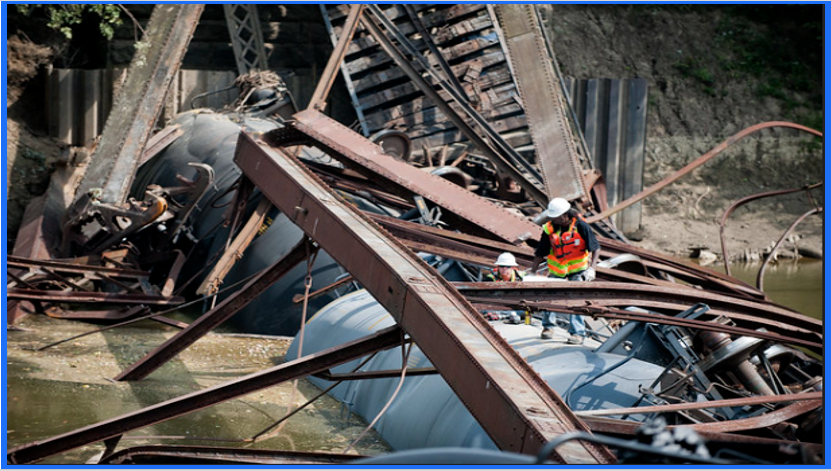Two separate railway bridge collapses occurred overnight on the night of 31/05/2025 in Russia’s border regions of Bryansk and Kursk, resulting in a deadly train derailment and further escalating tensions in the region.
In Bryansk, a key western region bordering Ukraine, a passenger train traveling from Klimov to Moscow derailed after a railway bridge collapsed while the train was crossing. According to Russian officials, an explosion was reported on the bridge just before the derailment. The incident killed at least seven people and injured 66 others, 47 of whom were hospitalized. The train was carrying 388 passengers at the time.
Simultaneously, in the Kursk region to the north—also bordering Ukraine—a freight train was derailed when another railway bridge collapsed. Regional authorities confirmed the incident but reported fewer casualties. According to Acting Governor Alexander Khinshtein, part of the derailed train fell onto a road beneath the bridge, injuring at least one worker.
These near-simultaneous collapses—both in strategic border areas—have raised alarm within the Russian government, which swiftly attributed the incidents to sabotage.
Accusations Against Ukraine Amidst Peace Talks
Russian officials, including members of the Federation Council, were quick to blame Ukraine. Andrei Klishas, chairman of the Council’s Committee on State Construction, claimed the bridge explosions were acts of terrorism orchestrated by Kyiv.
“The blowing up of the bridge and the derailment of the passenger train in the Bryansk region indicate that Ukraine is controlled by a terrorist group,” Klishas wrote on Telegram.
The Kremlin confirmed that President Vladimir Putin was briefed on the developments, receiving updates from the Federal Security Service (FSB) and the Ministry of Emergency Situations.
Ukraine Denies Involvement, Calls Accusations ‘Propaganda’
Ukrainian officials strongly denied responsibility. Andriy Kovalenko, head of Ukraine’s Counter-Disinformation Center, suggested the timing of the accusations was politically motivated, coming just ahead of planned peace talks in Istanbul.
“It seems that the Kremlin is preparing the ground for the disruption of the talks,” Kovalenko said in a Telegram post. “Ukraine has no motive to disrupt the Istanbul summit. On the contrary, Ukraine agreed to a ceasefire long ago. Therefore, a rail war in the style of World War II is an argument for Russian propaganda, not an instrument of our policy.”
While Kyiv denies direct involvement in these incidents, Ukrainian intelligence services have acknowledged targeting Russian railway infrastructure in the past—particularly in occupied territories—as part of efforts to disrupt military logistics. These have included sabotage operations and arson attacks, often without formal claims of responsibility.
Wider Escalation on Both Sides
The violence extended beyond the railway attacks. On Sunday, Ukraine’s military intelligence agency (GUR) reported that an explosion derailed a freight train carrying fuel in occupied southern Ukraine. The train was reportedly en route to Crimea, and the explosion disrupted what the GUR described as a key supply line for Russian forces.
Elsewhere, a source in Ukraine’s Security Service (SBU) told ABC News that a large-scale strike on four Russian military airfields had damaged or destroyed over 40 aircraft believed to be involved in bombing Ukrainian cities.
Russia also reported drone attacks in Irkutsk and Murmansk, far from the front lines. The governor of Irkutsk claimed the drones were launched from a truck, and posted footage showing multiple drones in the sky and large smoke plumes rising in the aftermath.
Meanwhile, Russia continued its own offensive across Ukraine. The Ukrainian Air Force reported that 479 drones and missiles were launched overnight—potentially the largest single aerial attack since the war began. Ukrainian defenses intercepted 385, but reported damage in at least 18 locations.
A Russian missile strike on a Ukrainian military training facility also killed 12 people and injured 60, according to Ukrainian Ground Forces.
A Fragile Diplomatic Moment
As the Istanbul peace talks draw near, the escalation on both sides underscores the fragility of diplomatic efforts. While Ukrainian officials maintain they are committed to a ceasefire, the Kremlin’s accusations and ongoing military operations on both sides signal continued volatility in a conflict now entering its fourth year.
For illustration purposes only: Collapsed Bridge Crashed Bridge by Judd McCullum, Flickr



